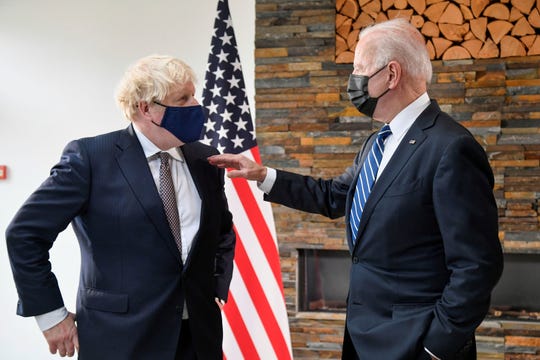
G-7 final day: What’s happening, and what we we’ve learned so far
FALMOUTH, England – The final day of talks at the Group of Seven summit in Cornwall kicked off Sunday with a focus on climate change.
President Joe Biden has been here at the southwestern tip of the British Isles since Thursday for discussions with world leaders that have ranged across the coronavirus pandemic, ways to counter an ascendent China and global inequality.
Later Sunday, Biden will travel to Brussels for a NATO alliance summit on Monday, and separate talks Tuesday with European Union leaders. But before he heads to continental Europe, Biden will briefly stop at Windsor Castle for tea with the queen.
Here’s what happening today, and what we’ve learned so far:
China is the subtext to everything
Relations between wealthy G-7 industrialized nations and Beijing was not expected to be on the formal agenda in Cornwall. But China – its economic might, geopolitical ambition, approach to human rights and role in the coronavirus pandemic – has informed much of the discussion over the last few days.
Five takeaways from Day 2 of G-7: COVID’s ‘roots,’ China, protests at sea
We don’t yet know how aggressively China will be specifically called out in the G-7 communiqué that will be published today, especially in regard to allegations over its forced labor camps in Xinjiang. However, on Saturday the leaders of the world’s richest democracies unveiled a plan to counter China’s growing influence among developing nations through an initiative called Build Back Better World, or B3W.
A woman walks her dogs as the incoming tide begins to wash away the heads of G-7 leaders drawn in the sand by activists on the beach at Newquay, Cornwall, England, Thursday, June 10, 2021. (Photo: Jon Super, AP)
B3W is described as an alternative to President Xi Jinping’s multi-trillion-dollar Belt and Road initiative (BRI), a massive infrastructure building program that spans dozens of countries, as well as multiple oceans and continents. BRI takes the form of debt-financed ports, railways, highways, dams, cargo depots and other critical infrastructure.
“This is not just about confronting or taking on China,” the White House said of B3W. “But until now we haven’t offered a positive alternative that reflects our values, our standards and our way of doing business.”
Still, Huiyao Wang, a senior adviser to China’s government, told USA TODAY in a phone interview from Beijing on Sunday that whatever the goal of B3W may be, there is a danger it could further drive an adversarial wedge between the West and China.
President Joe Biden and British Prime Minister Boris Johnson have much to discuss before the G-7 summit in Cornwall, Britain. (Photo: Pool photo by Toby Melville)
“China doesn’t want this to be ‘us’ versus ‘you.’ China started BRI because it saw there was a tremendous demand for it in the global South. If the U.S and other G-7 countries want to work on infrastructure projects in these places that’s fine,” he said.
The G-7 did not announce specific targets or a budget for its initiative.
Low coal is the goal
The British broadcaster and wildlife expert Sir David Attenborough told world leaders in Cornwall on Sunday that human beings may be “on the verge of destabilizing the entire planet,” as he urged them to do more while they are in the U.K. to take potentially planet-changing decisions on climate change.
“The decisions we make this decade – in particular the decisions made by the most economically advanced nations – are the most important in human history,” he said
Biden overseas: 4 takeaways from Joe Biden’s first meeting with Boris Johnson
Attenborough’s warming came as the White House announced that Biden and his fellow G-7 leaders had agreed a “concrete set of actions” to accelerate the transition away from “unabated coal power generation,” which is the largest single biggest source of greenhouse gas emissions globally. Under the plan, G-7 countries will, by the end of this year, end all government support for international thermal goal power generation.
Police officers photograph the route of the motorcade of President Joe Biden after he attended a church service with first lady Jill Biden in St. Ives, Cornwall, England, on June 13, 2021. (Photo: Jon Super, AP)
‘Who’s got all the money? We have’:G-7 protests hit the beach with blimps, games, banners, flames, kayaks, air horns and more
They committed to provide up to $2 billion to investment funds focused on helping developing countries move away from coal to cleaner energies. They also pledged, for the first time, to “align their long-term and short-term climate goals in a manner consistent with keeping” projected global temperature rises to 1.5 degrees Celsius.
However, for many of the protesters who descended on Cornwall over the last few days these pledges were not enough to stave off the climate emergency.
It’s Sunday, so the Bidens went to church
Biden, just the second Catholic to become U.S. president, goes to church every Sunday.
Despite being far from home, today was no different.
Biden and First Lady Jill Biden attended mass in St Ives, Cornwall.
Details of the service were scant.
As he emerged from the service, Biden said just one word: “Beautiful.”
President Joe Biden and US First Lady Jill Biden leave church after in St Ives, Cornwall on June 13, 2021. (Photo: AFP via Getty Images)
This pandemic and the next one
Leaders committed to the “Carbis Bay Declaration,” a series of recommendations and steps G-7 countries will take to prevent a future pandemic.
Those steps include cutting the time taken to develop and license vaccines, treatments and diagnostics for any future disease to under 100 days; a commitment to reinforce global surveillance networks and genomic sequencing capacity; and support for reforming and strengthening the World Health Organization.
G-7 leaders were also asked to donate 1 billion doses of COVID-19 vaccines to poorer countries over the next year. Ahead of the summit, Biden pledged to donate 500 million doses of Pfizer’s coronavirus vaccine to nearly 100 lower income countries and the African Union. Johnson said his country would gift more than 100 million doses, likely of the Oxford-AstraZeneca vaccine.
Source: Read Full Article



